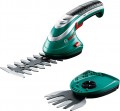Pole length
The length of the bar usually refers to the total length of the brush attachment or saw blade (see Attachments) supplied with the hedge trimmer. The
longer the tire, the longer the cut that the tool can make at a time. In general, it is believed that a short length is typical for entry-level tools, while professional ones are equipped with larger attachments. However, here you need to take into account that the choice depends not only on the scale, but also on the specifics of the intended work: long attachments are less maneuverable and less suitable for topiary trimming of bushes. In addition, the cost of a brush cutter also largely depends on this parameter.
Battery
Features of the battery-powered hedge trimmer. Most devices out of the box have
one battery. But there are models that are equipped with a replaceable battery (
2 batteries included). This solution allows you to extend the operating time of the device by replacing a discharged battery with a charged one. And
the absence of a battery in the kit will be appropriate if you buy a hedge trimmer, which is suitable for a universal battery from other devices of the brand. Or you yourself want to choose a model with the required capacity. And for low-power devices there is
a built-in battery.
Battery voltage
Operating voltage of the battery in a battery-powered hedge trimmer (see above). This parameter is usually selected by the manufacturer according to the characteristics of the engine: the greater the power, the greater, the battery voltage is likely to be. In fact, voltage data may be needed only if the battery fails and it will be necessary to replace it with an equivalent one. In addition, there are formulas that allow you to roughly estimate the battery life depending on the battery voltage, its capacity and the power of the tool; they can be found in special sources.
Operating time
The maximum time for which the cordless hedge trimmer can work without additional charging. Note that the maximum period is indicated, which is often overestimated by the manufacturer and is calculated at idle. Under load, this parameter will be less.
Charging time
The time it takes to charge the brush cutter battery from 0 to 100%.
Noise level
Approximate noise level produced by the hedge trimmer in normal operation. This parameter allows you to evaluate how comfortable it will be to work with the tool: the lower the noise level, the less discomfort it causes for the operator and others, and the lower the likelihood that special hearing protection will be needed during operation. At the same time, note that loud noise is an inevitable side effect of high power — it would be too expensive and difficult to make a powerful and low-noise tool. In addition, this figure is only approximate. Firstly, different manufacturers may indicate it differently: for idling, for full speed, for half power, etc. Secondly, the actual volume of work may also differ from the claimed one due to the peculiarities of a particular situation: for example, working with thick branches leads to an increase in the load on the engine, which can also affect the noise level.
Another specific point is that the decibel used to measure this indicator is a non-linear value: an increase of 1 dB corresponds to an increase of 1.26 times, 3 dB — 2 times, etc. Therefore, to assess the loudness of work, it is easiest to use comparative tables. Here is one of the simplified versions of such a table for the range in which most modern hedge trimmers work:
65 dB — loud conversation at a distance of a metre;
70 dB — loud conversation of several people at the same distance;
75 dB — shout from the same distance;
80 dB — the ringin...g of a mechanical alarm clock, a loud cry at a distance of 1 m;
85 dB — loud screams at a distance of 1 m;
90 dB — heavy truck or freight car at a distance of 7 m;
95 dB — subway car at a distance of 7 m;
100 dB — noisy industrial shop.
Weight
The total weight of the brush cutter. Usually indicated for a fully equipped tool, with an attachment installed and, in the case of a petrol engine, a full tank of fuel; however, there may be exceptions. Usually, the relevant data is indicated in the official documentation.
This parameter is important, first of all, taking into account the fact that the tool during work will have to be kept on weight most of the time. Accordingly, the lighter the brush cutter, the longer you can work with it without interruption, the less often you have to rest. On the other hand, a large weight also has its advantages: a heavy tool is more stable and does not “tear out of hand” as much under high loads on the nozzle.

